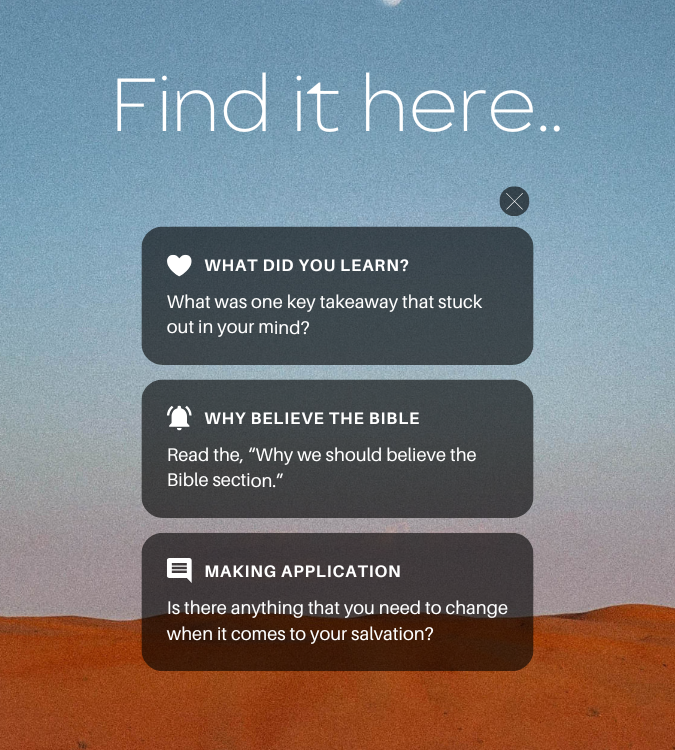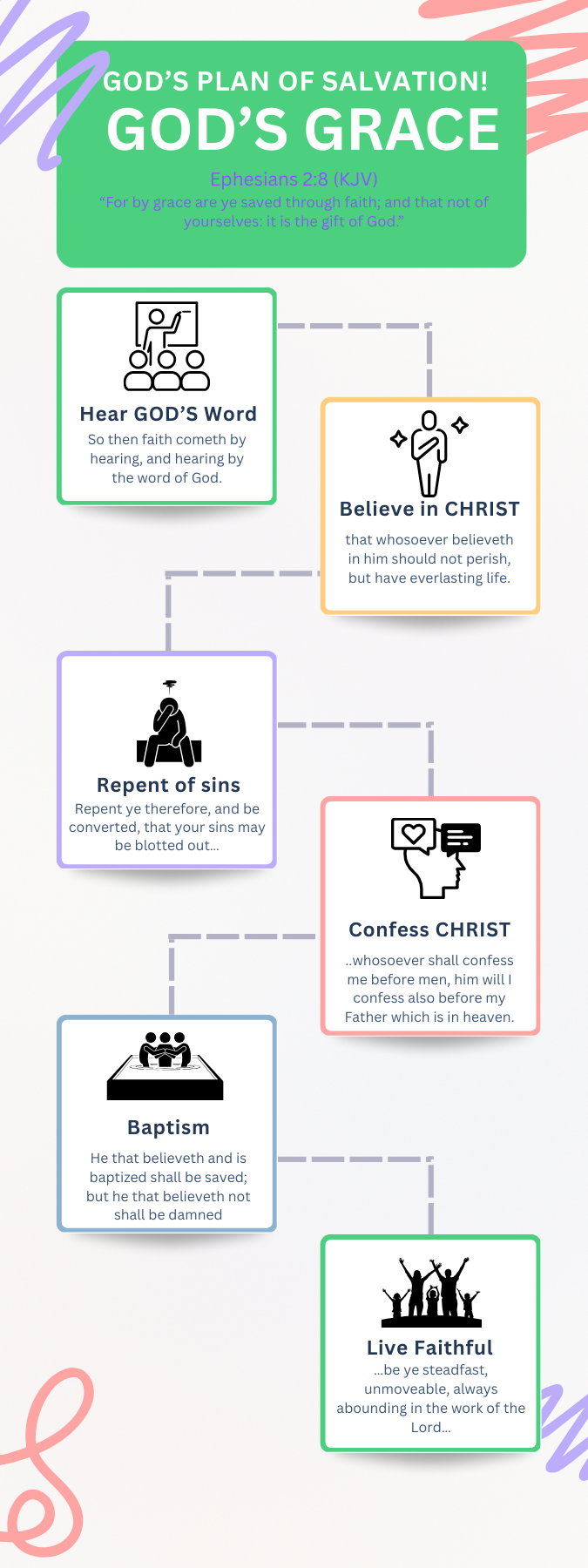What We Learn from the Video
The video opens a vital conversation about what it truly means to be saved. Many people assume that simply being part of the “right” denomination guarantees salvation, but the speaker challenges this common belief. He shares his personal journey, saying, “I thought being part of the right denomination meant I was saved. But then I read that Jesus didn't create denominations. He built one church.” This powerful statement captures the heart of the message: salvation is not tied to a church name, tradition, or human-made system—it is tied to following Jesus Christ and obeying the Bible’s teachings.
Viewers learn that denominations, while familiar and comforting, can sometimes distract from the Bible plan of salvation. The video encourages Christians to examine whether their beliefs align with Scripture, particularly on key topics like baptism, repentance, and faith. The speaker emphasizes the difference between following man-made rules and following the church that Jesus Himself built, a church that cannot be split by human labels or divisions.
The video also highlights the importance of personal responsibility in spiritual growth. By stepping away from denominational identity and embracing the truth of the Bible, the speaker found clarity, freedom, and a deeper connection to God’s plan. This shift demonstrates that salvation requires both understanding and action, not mere association.
For anyone seeking the truth about salvation, this video offers a compelling reminder: being “just a Christian” in the church Christ established brings the focus back to what matters most—obedience to God and a genuine relationship with Jesus. It challenges viewers to consider, Am I following man’s rules, or God’s plan?
Why We Should Believe the Bible
The Bible stands apart from every other book in history because of its trustworthiness and divine origin. Unlike human writings that can contain errors or personal opinions, the Scriptures are inspired by God and preserved for our guidance. As the video reminds us, “Jesus didn't create denominations. He built one church,” pointing to the authority of God’s Word over man-made systems. This underscores why Christians must rely on the Bible as their ultimate guide in understanding salvation and living a faithful life.
Fulfilled Prophecy and Historical Accuracy
One of the clearest proofs of the Bible’s reliability is its record of fulfilled prophecy. Hundreds of predictions, from the rise and fall of empires to the coming of the Messiah, were written centuries before they occurred. These accurate forecasts show that God’s Word is truth, not human speculation. Historical accounts within Scripture have also been corroborated by archaeology and external records, confirming the Bible’s authenticity.
Eyewitness Testimony and Divine Inspiration
The New Testament draws on the testimony of those who witnessed Jesus’ ministry firsthand. Apostles like Peter and John shared events they personally experienced, giving credibility to the gospel message. Combined with the guidance of the Holy Spirit, the Bible was carefully recorded, passed down, and preserved, ensuring that God’s message reaches us today in full integrity.
Christians are called to recognize the authority of the Bible in all areas of life. It provides clear instruction on salvation, including the Bible plan of salvation and the truth about baptism. When we trust God’s Word rather than human opinions or traditions, we align ourselves with the church that Jesus Himself built.
Viewing the Scriptures as fully reliable transforms faith into action. The Bible is not just a guide; it is the final authority, shaping belief, behavior, and eternal destiny. As Psalm 119:160 says, “The sum of Your word is truth, and every one of Your righteous rules endures forever.”
How to Apply This Truth to My Life
Understanding God’s Word is only meaningful when it shapes our daily choices. The video emphasizes that true Christian living involves obedience, not simply belonging to a denomination. As the speaker shares, “I left my denomination and became just a Christian, part of the church that Jesus built, not one that man split off.” This highlights the need to actively apply God’s Word rather than relying on tradition or labels.
1. Study the Scriptures Daily
Begin by setting aside regular time to read and reflect on the Bible. Focus on passages about the Bible plan of salvation, baptism, repentance, and faith. Journaling insights can help solidify understanding and reveal areas where personal practice may fall short.
2. Examine Your Beliefs
Evaluate whether your current beliefs align with Scripture. Ask if your faith is shaped by God’s Word or by man-made traditions. This step encourages sincere reflection and a commitment to follow the church Jesus built.
3. Obey the Gospel
Applying God’s Word requires taking tangible steps, such as repentance, confession, and baptism. Obedience demonstrates genuine faith and ensures alignment with the truth about salvation.
4. Live Out Your Faith Daily
Christian living extends beyond rituals. Show love, integrity, and service in everyday life, letting your faith influence decisions at work, in family, and in community.
Example in modern life: A young professional might attend a church out of habit, following its customs without question. By applying Scripture personally, she studies the Bible, understands the plan of salvation, and chooses to participate in the church Christ established. This leads to a clearer sense of purpose, stronger faith, and authentic spiritual growth.
Applying God’s Word transforms both heart and action. By committing to obedience, regular study, and reflection, we step out of man-made patterns and embrace the life Jesus intended for His followers.
What This Denomination Teaches about Salvation
In the video, the speaker reflects on his personal journey within a denominational context, stating, “I thought being part of the right denomination meant I was saved. But then I read that Jesus didn't create denominations. He built one church.” This sentiment highlights a prevalent teaching in many denominations: salvation is often associated with denominational affiliation and specific doctrinal practices.
The Denominational View of Salvation
Many mainstream Christian denominations teach that salvation is attained through faith alone—a doctrine known as sola fide. This belief asserts that individuals are justified and saved solely by faith in Jesus Christ, without the necessity of additional acts or sacraments. For instance, the "Sinner's Prayer" is commonly promoted as a means to receive salvation. This prayer typically involves confessing sins and accepting Jesus as Lord and Savior, often leading to an assurance of salvation.
Additionally, some denominations emphasize the importance of water baptism, though its role varies. In certain traditions, baptism is viewed as an outward sign of an inward faith, symbolizing the believer's identification with Christ's death, burial, and resurrection. However, these denominations may not necessarily teach that baptism is essential for salvation.
Divergence from New Testament Teachings
The New Testament presents a more integrated approach to salvation, emphasizing both faith and obedience. For example, in Acts 2:38, Peter instructs, “Repent and be baptized, every one of you, in the name of Jesus Christ for the forgiveness of your sins.” This passage suggests that repentance and baptism are integral steps in the salvation process.
Furthermore, passages like Romans 6:3-4 and Galatians 3:26-27 underscore the significance of baptism as a means of entering into a covenant relationship with God. These scriptures indicate that baptism is not merely symbolic but a necessary act of obedience for the remission of sins.
While denominational teachings on salvation may offer comfort and clarity to many, they often diverge from the comprehensive teachings found in the New Testament. The Bible presents salvation as a process that involves faith, repentance, and baptism, all of which are essential for the forgiveness of sins and the receipt of the Holy Spirit.
Therefore, it is imperative for individuals to examine their beliefs in light of Scripture, ensuring that their understanding and practice of salvation align with the teachings of the New Testament.
What the Bible Teaches about Salvation
Understanding salvation requires looking directly at the Bible and following the steps God Himself outlined. The New Testament offers a clear, actionable path—the Bible way to be saved—that includes hearing, believing, repenting, confessing, being baptized, and living faithfully. This plan is not tied to denominations or traditions but reflects the instructions of Jesus and His apostles.
1. Hearing the Word
The first step in the New Testament plan of salvation is hearing the gospel. Romans 10:17 states, “So faith comes from hearing, and hearing through the word of Christ.” Salvation begins when a person listens to God’s Word, whether through preaching, reading, or study. Hearing the gospel allows the truth about salvation to reach the heart. Without hearing, faith cannot develop. This step is active; it requires seeking God’s Word deliberately and being open to its message.
2. Believing in Jesus
Faith is the response to hearing. Mark 16:16 says, “Whoever believes and is baptized will be saved, but whoever does not believe will be condemned.” Belief is more than intellectual acknowledgment—it involves trusting Jesus Christ as Lord and committing one’s life to Him. Belief motivates the obedience that follows, making it a vital part of the Bible plan of salvation. Asking, “What must I do to be saved?” always begins with faith in the one God sent to redeem humanity.
3. Repentance from Sin
Repentance is a turning away from sin and a turning toward God. Acts 2:38 records Peter’s instructions: “Repent and be baptized every one of you in the name of Jesus Christ for the forgiveness of your sins.” Genuine repentance involves sorrow for sin, a change of heart, and a willingness to obey God. Repentance shows that salvation is not just a mental decision but a moral and spiritual transformation. Without it, faith remains incomplete.
4. Confession of Faith
Confession is a public declaration of belief. Romans 10:9-10 explains, “If you confess with your mouth that Jesus is Lord and believe in your heart that God raised him from the dead, you will be saved. For with the heart one believes and is justified, and with the mouth one confesses and is saved.” Confession confirms faith and allows others to recognize a person’s commitment to Christ. It bridges private belief and public obedience, reinforcing the community and accountability aspects of the New Testament plan of salvation.
5. Baptism for the Remission of Sins
Baptism is often misunderstood or minimized in some churches, but the Bible presents it as essential. Acts 2:38 emphasizes baptism as a condition for the forgiveness of sins: “Repent and be baptized every one of you in the name of Jesus Christ for the forgiveness of your sins.” 1 Peter 3:21 reinforces this: “Baptism, which corresponds to this, now saves you, not as a removal of dirt from the body but as an appeal to God for a good conscience, through the resurrection of Jesus Christ.” Baptism is not just symbolic; it is an act of obedience that unites the believer with Christ’s death, burial, and resurrection. This is the truth about baptism: it washes away sins and initiates a new life in Christ.
Living Faithfully
Salvation is not a one-time event but a lifelong journey. Revelation 2:10 encourages believers: “Be faithful unto death, and I will give you the crown of life.” Living faithfully includes continuing in obedience, prayer, Scripture study, and service. It reflects a heart transformed by God and demonstrates that salvation is more than initial compliance—it is enduring commitment. Faithful living also protects against falling away and strengthens witness to others.
Practical Steps for Applying the Bible Way to Be Saved
- Hearing: Attend Bible studies, read Scripture daily, and listen to sermons to absorb God’s Word.
- Believing: Meditate on Jesus’ teachings and cultivate trust in His promises.
- Repenting: Examine your life, confess sins to God, and make tangible changes in behavior.
- Confessing: Share your faith with friends, family, and the church community.
- Baptism: Contact a local congregation that teaches biblical baptism and obey as an act of obedience.
- Living Faithfully: Maintain a prayerful, Scripture-filled lifestyle and serve others in love.
Why This Matters
Following the New Testament plan of salvation ensures that faith is genuine, obedience is complete, and forgiveness of sins is received according to God’s instructions. Denominational shortcuts, such as relying solely on the sinner’s prayer or assuming faith alone is sufficient, leave out key steps that Scripture highlights. By hearing, believing, repenting, confessing, being baptized, and living faithfully, believers fully embrace the Bible way to be saved.
Heartfelt Appeal
If you have been relying on traditions, denominational labels, or incomplete teachings, take this message to heart. God’s Word provides a clear, complete path to salvation. The steps are accessible, understandable, and life-changing. Embrace them today, and commit to following Christ fully. Ask yourself, “Am I obeying the plan God laid out, or am I relying on human assumptions?” Choosing the Bible plan of salvation is choosing life, forgiveness, and eternal hope. Let today be the day you step into the fullness of God’s promises.
Background of the Denomination
The denomination in question traces its origins to the early 19th century, emerging from the broader Protestant movement. It was founded by a prominent figure who sought to reform existing religious practices and return to what he perceived as the original teachings of Christianity. This founder emphasized the authority of Scripture and the necessity of adhering strictly to biblical principles.
Founding and Early Development
In the early 1800s, the founder began preaching a message that challenged prevailing denominational norms. He advocated for a return to New Testament Christianity, rejecting human-made traditions and emphasizing the importance of personal Bible study. His teachings attracted a following, leading to the establishment of congregations that identified with his vision.
Core Doctrines
The denomination's core doctrines center on the belief that salvation is found solely through faith in Jesus Christ, as revealed in the New Testament. Adherents emphasize the necessity of baptism by immersion for the remission of sins, viewing it as a direct command from Scripture. The Lord's Supper is observed regularly, serving as a memorial of Christ's sacrifice. Church governance is congregational, with each local assembly autonomous yet united in doctrine and purpose.
Historical Context
The denomination arose during a period of religious revival and reform, known as the Second Great Awakening, which sought to restore what were seen as the original practices of the early church. This movement was characterized by a desire to eliminate denominational divisions and return to a unified, New Testament-based Christianity.
Key Bible Passages to Read and Study
Studying Scripture is essential for understanding God’s plan of salvation and growing in faith. The following Bible verses about salvation provide guidance, clarity, and assurance for those seeking eternal life. Each verse highlights a key step or principle in the New Testament plan of salvation.
- Romans 10:17 – “So faith comes from hearing, and hearing through the word of Christ.”
Hearing God’s Word is the first step toward salvation, as faith begins with understanding the gospel.
- Mark 16:16 – “Whoever believes and is baptized will be saved, but whoever does not believe will be condemned.”
Faith and baptism are closely linked in the Bible way to be saved, demonstrating trust in Jesus and obedience to God.
- Acts 2:38 – “Repent and be baptized every one of you in the name of Jesus Christ for the forgiveness of your sins.”
Repentance and baptism are vital for the remission of sins, showing a heart committed to God.
- Romans 10:9-10 – “If you confess with your mouth that Jesus is Lord and believe in your heart that God raised him from the dead, you will be saved.”
Confession confirms belief and aligns the heart and mouth in obedience.
- 1 Peter 3:21 – “Baptism… now saves you, not as a removal of dirt from the body but as an appeal to God for a good conscience.”
Baptism is an outward demonstration of inward faith, appealing to God for forgiveness.
- Revelation 2:10 – “Be faithful unto death, and I will give you the crown of life.”
Living faithfully is essential to maintaining salvation and honoring God’s promises.
- John 3:16 – “For God so loved the world, that he gave his only Son, that whoever believes in him should not perish but have eternal life.”
Belief in Jesus leads to eternal life and forms the foundation of salvation.
- Acts 22:16 – “And now why do you wait? Rise and be baptized and wash away your sins, calling on his name.”
Immediate obedience through baptism demonstrates a decisive step in following Christ.
- Ephesians 2:8-9 – “For by grace you have been saved through faith. And this is not your own doing; it is the gift of God.”
Salvation is a gift from God, received by faith and not by human effort alone.
- Galatians 3:27 – “For as many of you as were baptized into Christ have put on Christ.”
Baptism unites believers with Christ and signifies a new life in Him.
These Scriptures for eternal life guide believers in applying God’s plan of salvation. Regular reading and reflection deepen understanding and strengthen faith in the Bible’s truth about salvation.
Common Misunderstandings about Salvation
Many people carry misconceptions about grace and salvation, often influenced by denominational teachings or cultural beliefs. The video highlights one key realization: “I couldn’t find them [denominational practices] in the Bible,” emphasizing that true understanding of salvation comes directly from Scripture. Below are several common errors and their biblical corrections.
1. Faith Alone Guarantees Salvation
A widespread belief is that faith alone automatically saves, without the need for repentance, confession, or baptism. While faith is essential, James 2:17 clarifies, “So also faith by itself, if it does not have works, is dead.” Genuine faith produces obedience. Acts 2:38 shows that repentance and baptism accompany faith: “Repent and be baptized every one of you in the name of Jesus Christ for the forgiveness of your sins.” Salvation involves both belief and action, not belief in isolation.
2. Baptism is Optional
Some teach that baptism is symbolic or unnecessary for salvation. The truth about baptism, however, is revealed in Scripture. 1 Peter 3:21 states, “Baptism… now saves you… through the resurrection of Jesus Christ.” Baptism is an integral part of God’s plan, washing away sins and initiating a covenant relationship with Christ. Treating it as optional contradicts the New Testament instructions.
3. People Are Saved Before Baptism
Closely related is the idea that a person is saved the moment they pray or profess belief, even before baptism. Acts 22:16 corrects this: “And now why do you wait? Rise and be baptized and wash away your sins, calling on his name.” Obedience through baptism is a necessary step in receiving God’s forgiveness.
4. Universalism
Some believe everyone is automatically saved regardless of faith or actions. This misunderstanding overlooks the need for personal commitment. John 3:36 reminds us, “Whoever believes in the Son has eternal life; whoever does not obey the Son shall not see life, but the wrath of God remains on him.” Eternal life is conditional on belief, repentance, and obedience.
5. Misconceptions about Grace
Misinterpretations of grace can lead to thinking that sin has no consequences. Romans 6:1-2 counters this: “Shall we continue in sin that grace may abound? By no means! How can we who died to sin still live in it?” Grace enables salvation, but it does not excuse disobedience. Understanding grace correctly ensures that salvation aligns with the New Testament plan.
False teachings about salvation persist when people rely on tradition or human reasoning instead of Scripture. By examining the Bible carefully, believers can discern the truth about baptism, obedience, and the full path to eternal life. Rejecting misconceptions about grace and faith protects the soul and strengthens the walk with Christ.
Real-Life Examples of Changed Lives
Real-life examples demonstrate the transformative power of obeying the gospel. When individuals follow the Bible plan of salvation, their lives are changed from the inside out, offering hope and encouragement to others seeking the truth.
Testimony 1: From Tradition to Truth
One young woman grew up believing that simply attending her family’s church guaranteed her salvation. She assumed faith alone was enough. After studying Scripture and learning the New Testament plan of salvation, she realized the importance of repentance, confession, and baptism. She shared, “I finally understood what God required of me, and obeying His Word changed my life completely.” Following God’s plan brought her peace, purpose, and a closer relationship with Jesus. This Christian testimony highlights how moving from tradition-based assumptions to biblical obedience transforms faith into action.
Testimony 2: Overcoming Misunderstanding
A man had long assumed that prayer alone secured eternal life. When he heard about the Bible way to be saved, he recognized that his previous understanding was incomplete. He repented, confessed his faith publicly, and was baptized in obedience to Scripture. Since then, he has actively served in his local congregation and shares his story with others. His changed life through the gospel reflects joy, commitment, and a deep sense of God’s guidance in daily decisions.
These stories echo the message of the video: “I left my denomination and became just a Christian, part of the church that Jesus built.” Obedience to God’s Word produces real change, proving that salvation is not about labels or human traditions but about following Jesus faithfully. Anyone willing to follow the Bible plan of salvation can experience a life renewed and strengthened by Christ’s love.
Why Urgency Matters in Responding to the Gospel
The Bible repeatedly stresses the urgency of salvation, reminding us that today is the day to respond to God’s call. Delaying obedience to the gospel can have eternal consequences, as life is uncertain and the opportunity for repentance is not guaranteed. The speaker in the video experienced this truth firsthand, realizing that denominational identity alone could not secure salvation: “I thought being part of the right denomination meant I was saved. But then I read that Jesus didn't create denominations. He built one church.” This realization underscores the need to act now, following the Bible plan of salvation.
Life is Short and Uncertain
James 4:14 asks, “What is your life? For you are a mist that appears for a little time and then vanishes.” Life is fleeting, and we cannot predict when our time will end. Waiting to obey God’s Word or assuming there will be a “better time” is risky. Every day we delay is a day we might miss the opportunity to obey the gospel fully, including repentance, confession, and baptism.
God’s Timing is Now
2 Corinthians 6:2 declares, “Behold, now is the favorable time; behold, now is the day of salvation.” God sets the timing for opportunity, not humans. Procrastination can lead to regret or a lost chance to secure eternal life. The urgency of salvation is not meant to instill fear but to motivate immediate, decisive action in following Christ’s commands.
Avoiding False Assurance
Many assume that good intentions, faith alone, or denominational membership guarantees salvation. The video warns against this mindset, emphasizing that true salvation comes from obeying the gospel in practice, not just in name. Acting immediately ensures that our faith is accompanied by the obedience God requires, including repentance and baptism, the full New Testament plan of salvation.
Practical Implications
Responding promptly means taking concrete steps today. Read Scripture regularly, confess your faith, repent sincerely, and be baptized without delay. Every moment spent hesitating could postpone the blessing of forgiveness and the joy of a reconciled relationship with God. Living with urgency reinforces commitment and demonstrates a heart fully aligned with God’s will.
The call to action is clear: do not delay obeying the gospel. Life is unpredictable, and salvation depends on responding to God’s Word now, not tomorrow. Today is the day to follow Christ fully, embrace His plan of salvation, and experience the transformation that obedience brings. “I left my denomination and became just a Christian, part of the church that Jesus built,” the speaker reminds us, showing that decisive action leads to eternal hope and a renewed life in Christ.
Questions to Ask Yourself After Watching
After watching the video, it’s important to pause and examine your heart in light of Scripture. These reflective questions help you consider your spiritual condition, your response to the Bible truth about salvation, and your eternal destiny.
- Am I truly saved?
Do I have assurance of salvation based on obedience to God’s Word, or am I relying on denominational affiliation or personal assumptions?
- Have I obeyed the full Bible plan of salvation?
Have I heard, believed, repented, confessed, and been baptized as Scripture teaches?
- What role does faith play in my life?
Is my faith active and living, producing repentance, confession, and obedience, or is it merely a passive belief?
- Have I delayed obeying the gospel?
Am I waiting for a “better time” to follow Christ fully, or have I embraced the urgency of salvation today?
- Do I live faithfully each day?
Does my daily life reflect obedience, love, and service to God, or do I rely solely on past decisions for assurance?
- Am I trusting God’s Word above human tradition?
Are my beliefs aligned with Scripture, or influenced more by denominational practices and man-made teachings?
- How secure is my eternal destiny?
Am I confident in the forgiveness and salvation promised in the Bible, or do I need to take steps to ensure my place in God’s kingdom?
Reflecting on these questions can guide you toward clarity, conviction, and action. Honest self-examination helps confirm whether your faith aligns with the Bible truth about salvation and secures your eternal destiny in Christ.
Next Steps for Learning More
Understanding the Bible plan of salvation is just the beginning. If you want to grow in your faith and learn how to be saved according to Scripture, there are practical steps you can take today.
Join a Free Bible Study
Participating in a free Bible study allows you to explore God’s Word in depth, ask questions, and gain guidance from experienced teachers. This is an excellent way to strengthen your knowledge of the New Testament plan of salvation and apply it in your life.
Read More Articles
AreUSaved.com offers a wealth of articles on salvation, baptism, repentance, and living faithfully. Reading these resources will help you understand God’s commands clearly and provide encouragement as you follow Christ.
Contact Us
For personalized guidance, you can reach out through the AreUSaved.com chatbot or contact page. The team is ready to answer questions about salvation, help you examine your faith, and support you in taking the steps necessary for forgiveness and eternal life.
Don’t wait—today is the day to respond. Engaging in Bible study, reading Scripture-based articles, and seeking personal guidance ensures that your journey toward salvation is informed, confident, and aligned with God’s plan. Take action now, and grow in your faith with the support of resources designed to help you learn how to be saved.
What We Learn from the Video
The video opens a vital conversation about what it truly means to be saved. Many people assume that simply being part of the “right” denomination guarantees salvation, but the speaker challenges this common belief. He shares his personal journey, saying, “I thought being part of the right denomination meant I was saved. But then I read that Jesus didn't create denominations. He built one church.” This powerful statement captures the heart of the message: salvation is not tied to a church name, tradition, or human-made system—it is tied to following Jesus Christ and obeying the Bible’s teachings.
Viewers learn that denominations, while familiar and comforting, can sometimes distract from the Bible plan of salvation. The video encourages Christians to examine whether their beliefs align with Scripture, particularly on key topics like baptism, repentance, and faith. The speaker emphasizes the difference between following man-made rules and following the church that Jesus Himself built, a church that cannot be split by human labels or divisions.
The video also highlights the importance of personal responsibility in spiritual growth. By stepping away from denominational identity and embracing the truth of the Bible, the speaker found clarity, freedom, and a deeper connection to God’s plan. This shift demonstrates that salvation requires both understanding and action, not mere association.
For anyone seeking the truth about salvation, this video offers a compelling reminder: being “just a Christian” in the church Christ established brings the focus back to what matters most—obedience to God and a genuine relationship with Jesus. It challenges viewers to consider, Am I following man’s rules, or God’s plan?
Why We Should Believe the Bible
The Bible stands apart from every other book in history because of its trustworthiness and divine origin. Unlike human writings that can contain errors or personal opinions, the Scriptures are inspired by God and preserved for our guidance. As the video reminds us, “Jesus didn't create denominations. He built one church,” pointing to the authority of God’s Word over man-made systems. This underscores why Christians must rely on the Bible as their ultimate guide in understanding salvation and living a faithful life.
Fulfilled Prophecy and Historical Accuracy
One of the clearest proofs of the Bible’s reliability is its record of fulfilled prophecy. Hundreds of predictions, from the rise and fall of empires to the coming of the Messiah, were written centuries before they occurred. These accurate forecasts show that God’s Word is truth, not human speculation. Historical accounts within Scripture have also been corroborated by archaeology and external records, confirming the Bible’s authenticity.
Eyewitness Testimony and Divine Inspiration
The New Testament draws on the testimony of those who witnessed Jesus’ ministry firsthand. Apostles like Peter and John shared events they personally experienced, giving credibility to the gospel message. Combined with the guidance of the Holy Spirit, the Bible was carefully recorded, passed down, and preserved, ensuring that God’s message reaches us today in full integrity.
Christians are called to recognize the authority of the Bible in all areas of life. It provides clear instruction on salvation, including the Bible plan of salvation and the truth about baptism. When we trust God’s Word rather than human opinions or traditions, we align ourselves with the church that Jesus Himself built.
Viewing the Scriptures as fully reliable transforms faith into action. The Bible is not just a guide; it is the final authority, shaping belief, behavior, and eternal destiny. As Psalm 119:160 says, “The sum of Your word is truth, and every one of Your righteous rules endures forever.”
How to Apply This Truth to My Life
Understanding God’s Word is only meaningful when it shapes our daily choices. The video emphasizes that true Christian living involves obedience, not simply belonging to a denomination. As the speaker shares, “I left my denomination and became just a Christian, part of the church that Jesus built, not one that man split off.” This highlights the need to actively apply God’s Word rather than relying on tradition or labels.
1. Study the Scriptures Daily
Begin by setting aside regular time to read and reflect on the Bible. Focus on passages about the Bible plan of salvation, baptism, repentance, and faith. Journaling insights can help solidify understanding and reveal areas where personal practice may fall short.
2. Examine Your Beliefs
Evaluate whether your current beliefs align with Scripture. Ask if your faith is shaped by God’s Word or by man-made traditions. This step encourages sincere reflection and a commitment to follow the church Jesus built.
3. Obey the Gospel
Applying God’s Word requires taking tangible steps, such as repentance, confession, and baptism. Obedience demonstrates genuine faith and ensures alignment with the truth about salvation.
4. Live Out Your Faith Daily
Christian living extends beyond rituals. Show love, integrity, and service in everyday life, letting your faith influence decisions at work, in family, and in community.
Example in modern life: A young professional might attend a church out of habit, following its customs without question. By applying Scripture personally, she studies the Bible, understands the plan of salvation, and chooses to participate in the church Christ established. This leads to a clearer sense of purpose, stronger faith, and authentic spiritual growth.
Applying God’s Word transforms both heart and action. By committing to obedience, regular study, and reflection, we step out of man-made patterns and embrace the life Jesus intended for His followers.
What This Denomination Teaches about Salvation
In the video, the speaker reflects on his personal journey within a denominational context, stating, “I thought being part of the right denomination meant I was saved. But then I read that Jesus didn't create denominations. He built one church.” This sentiment highlights a prevalent teaching in many denominations: salvation is often associated with denominational affiliation and specific doctrinal practices.
The Denominational View of Salvation
Many mainstream Christian denominations teach that salvation is attained through faith alone—a doctrine known as sola fide. This belief asserts that individuals are justified and saved solely by faith in Jesus Christ, without the necessity of additional acts or sacraments. For instance, the "Sinner's Prayer" is commonly promoted as a means to receive salvation. This prayer typically involves confessing sins and accepting Jesus as Lord and Savior, often leading to an assurance of salvation.
Additionally, some denominations emphasize the importance of water baptism, though its role varies. In certain traditions, baptism is viewed as an outward sign of an inward faith, symbolizing the believer's identification with Christ's death, burial, and resurrection. However, these denominations may not necessarily teach that baptism is essential for salvation.
Divergence from New Testament Teachings
The New Testament presents a more integrated approach to salvation, emphasizing both faith and obedience. For example, in Acts 2:38, Peter instructs, “Repent and be baptized, every one of you, in the name of Jesus Christ for the forgiveness of your sins.” This passage suggests that repentance and baptism are integral steps in the salvation process.
Furthermore, passages like Romans 6:3-4 and Galatians 3:26-27 underscore the significance of baptism as a means of entering into a covenant relationship with God. These scriptures indicate that baptism is not merely symbolic but a necessary act of obedience for the remission of sins.
While denominational teachings on salvation may offer comfort and clarity to many, they often diverge from the comprehensive teachings found in the New Testament. The Bible presents salvation as a process that involves faith, repentance, and baptism, all of which are essential for the forgiveness of sins and the receipt of the Holy Spirit.
Therefore, it is imperative for individuals to examine their beliefs in light of Scripture, ensuring that their understanding and practice of salvation align with the teachings of the New Testament.
What the Bible Teaches about Salvation
Understanding salvation requires looking directly at the Bible and following the steps God Himself outlined. The New Testament offers a clear, actionable path—the Bible way to be saved—that includes hearing, believing, repenting, confessing, being baptized, and living faithfully. This plan is not tied to denominations or traditions but reflects the instructions of Jesus and His apostles.
1. Hearing the Word
The first step in the New Testament plan of salvation is hearing the gospel. Romans 10:17 states, “So faith comes from hearing, and hearing through the word of Christ.” Salvation begins when a person listens to God’s Word, whether through preaching, reading, or study. Hearing the gospel allows the truth about salvation to reach the heart. Without hearing, faith cannot develop. This step is active; it requires seeking God’s Word deliberately and being open to its message.
2. Believing in Jesus
Faith is the response to hearing. Mark 16:16 says, “Whoever believes and is baptized will be saved, but whoever does not believe will be condemned.” Belief is more than intellectual acknowledgment—it involves trusting Jesus Christ as Lord and committing one’s life to Him. Belief motivates the obedience that follows, making it a vital part of the Bible plan of salvation. Asking, “What must I do to be saved?” always begins with faith in the one God sent to redeem humanity.
3. Repentance from Sin
Repentance is a turning away from sin and a turning toward God. Acts 2:38 records Peter’s instructions: “Repent and be baptized every one of you in the name of Jesus Christ for the forgiveness of your sins.” Genuine repentance involves sorrow for sin, a change of heart, and a willingness to obey God. Repentance shows that salvation is not just a mental decision but a moral and spiritual transformation. Without it, faith remains incomplete.
4. Confession of Faith
Confession is a public declaration of belief. Romans 10:9-10 explains, “If you confess with your mouth that Jesus is Lord and believe in your heart that God raised him from the dead, you will be saved. For with the heart one believes and is justified, and with the mouth one confesses and is saved.” Confession confirms faith and allows others to recognize a person’s commitment to Christ. It bridges private belief and public obedience, reinforcing the community and accountability aspects of the New Testament plan of salvation.
5. Baptism for the Remission of Sins
Baptism is often misunderstood or minimized in some churches, but the Bible presents it as essential. Acts 2:38 emphasizes baptism as a condition for the forgiveness of sins: “Repent and be baptized every one of you in the name of Jesus Christ for the forgiveness of your sins.” 1 Peter 3:21 reinforces this: “Baptism, which corresponds to this, now saves you, not as a removal of dirt from the body but as an appeal to God for a good conscience, through the resurrection of Jesus Christ.” Baptism is not just symbolic; it is an act of obedience that unites the believer with Christ’s death, burial, and resurrection. This is the truth about baptism: it washes away sins and initiates a new life in Christ.
Living Faithfully
Salvation is not a one-time event but a lifelong journey. Revelation 2:10 encourages believers: “Be faithful unto death, and I will give you the crown of life.” Living faithfully includes continuing in obedience, prayer, Scripture study, and service. It reflects a heart transformed by God and demonstrates that salvation is more than initial compliance—it is enduring commitment. Faithful living also protects against falling away and strengthens witness to others.
Practical Steps for Applying the Bible Way to Be Saved
- Hearing: Attend Bible studies, read Scripture daily, and listen to sermons to absorb God’s Word.
- Believing: Meditate on Jesus’ teachings and cultivate trust in His promises.
- Repenting: Examine your life, confess sins to God, and make tangible changes in behavior.
- Confessing: Share your faith with friends, family, and the church community.
- Baptism: Contact a local congregation that teaches biblical baptism and obey as an act of obedience.
- Living Faithfully: Maintain a prayerful, Scripture-filled lifestyle and serve others in love.
Why This Matters
Following the New Testament plan of salvation ensures that faith is genuine, obedience is complete, and forgiveness of sins is received according to God’s instructions. Denominational shortcuts, such as relying solely on the sinner’s prayer or assuming faith alone is sufficient, leave out key steps that Scripture highlights. By hearing, believing, repenting, confessing, being baptized, and living faithfully, believers fully embrace the Bible way to be saved.
Heartfelt Appeal
If you have been relying on traditions, denominational labels, or incomplete teachings, take this message to heart. God’s Word provides a clear, complete path to salvation. The steps are accessible, understandable, and life-changing. Embrace them today, and commit to following Christ fully. Ask yourself, “Am I obeying the plan God laid out, or am I relying on human assumptions?” Choosing the Bible plan of salvation is choosing life, forgiveness, and eternal hope. Let today be the day you step into the fullness of God’s promises.
Background of the Denomination
The denomination in question traces its origins to the early 19th century, emerging from the broader Protestant movement. It was founded by a prominent figure who sought to reform existing religious practices and return to what he perceived as the original teachings of Christianity. This founder emphasized the authority of Scripture and the necessity of adhering strictly to biblical principles.
Founding and Early Development
In the early 1800s, the founder began preaching a message that challenged prevailing denominational norms. He advocated for a return to New Testament Christianity, rejecting human-made traditions and emphasizing the importance of personal Bible study. His teachings attracted a following, leading to the establishment of congregations that identified with his vision.
Core Doctrines
The denomination's core doctrines center on the belief that salvation is found solely through faith in Jesus Christ, as revealed in the New Testament. Adherents emphasize the necessity of baptism by immersion for the remission of sins, viewing it as a direct command from Scripture. The Lord's Supper is observed regularly, serving as a memorial of Christ's sacrifice. Church governance is congregational, with each local assembly autonomous yet united in doctrine and purpose.
Historical Context
The denomination arose during a period of religious revival and reform, known as the Second Great Awakening, which sought to restore what were seen as the original practices of the early church. This movement was characterized by a desire to eliminate denominational divisions and return to a unified, New Testament-based Christianity.
Key Bible Passages to Read and Study
Studying Scripture is essential for understanding God’s plan of salvation and growing in faith. The following Bible verses about salvation provide guidance, clarity, and assurance for those seeking eternal life. Each verse highlights a key step or principle in the New Testament plan of salvation.
- Romans 10:17 – “So faith comes from hearing, and hearing through the word of Christ.”
Hearing God’s Word is the first step toward salvation, as faith begins with understanding the gospel.
- Mark 16:16 – “Whoever believes and is baptized will be saved, but whoever does not believe will be condemned.”
Faith and baptism are closely linked in the Bible way to be saved, demonstrating trust in Jesus and obedience to God.
- Acts 2:38 – “Repent and be baptized every one of you in the name of Jesus Christ for the forgiveness of your sins.”
Repentance and baptism are vital for the remission of sins, showing a heart committed to God.
- Romans 10:9-10 – “If you confess with your mouth that Jesus is Lord and believe in your heart that God raised him from the dead, you will be saved.”
Confession confirms belief and aligns the heart and mouth in obedience.
- 1 Peter 3:21 – “Baptism… now saves you, not as a removal of dirt from the body but as an appeal to God for a good conscience.”
Baptism is an outward demonstration of inward faith, appealing to God for forgiveness.
- Revelation 2:10 – “Be faithful unto death, and I will give you the crown of life.”
Living faithfully is essential to maintaining salvation and honoring God’s promises.
- John 3:16 – “For God so loved the world, that he gave his only Son, that whoever believes in him should not perish but have eternal life.”
Belief in Jesus leads to eternal life and forms the foundation of salvation.
- Acts 22:16 – “And now why do you wait? Rise and be baptized and wash away your sins, calling on his name.”
Immediate obedience through baptism demonstrates a decisive step in following Christ.
- Ephesians 2:8-9 – “For by grace you have been saved through faith. And this is not your own doing; it is the gift of God.”
Salvation is a gift from God, received by faith and not by human effort alone.
- Galatians 3:27 – “For as many of you as were baptized into Christ have put on Christ.”
Baptism unites believers with Christ and signifies a new life in Him.
These Scriptures for eternal life guide believers in applying God’s plan of salvation. Regular reading and reflection deepen understanding and strengthen faith in the Bible’s truth about salvation.
Common Misunderstandings about Salvation
Many people carry misconceptions about grace and salvation, often influenced by denominational teachings or cultural beliefs. The video highlights one key realization: “I couldn’t find them [denominational practices] in the Bible,” emphasizing that true understanding of salvation comes directly from Scripture. Below are several common errors and their biblical corrections.
1. Faith Alone Guarantees Salvation
A widespread belief is that faith alone automatically saves, without the need for repentance, confession, or baptism. While faith is essential, James 2:17 clarifies, “So also faith by itself, if it does not have works, is dead.” Genuine faith produces obedience. Acts 2:38 shows that repentance and baptism accompany faith: “Repent and be baptized every one of you in the name of Jesus Christ for the forgiveness of your sins.” Salvation involves both belief and action, not belief in isolation.
2. Baptism is Optional
Some teach that baptism is symbolic or unnecessary for salvation. The truth about baptism, however, is revealed in Scripture. 1 Peter 3:21 states, “Baptism… now saves you… through the resurrection of Jesus Christ.” Baptism is an integral part of God’s plan, washing away sins and initiating a covenant relationship with Christ. Treating it as optional contradicts the New Testament instructions.
3. People Are Saved Before Baptism
Closely related is the idea that a person is saved the moment they pray or profess belief, even before baptism. Acts 22:16 corrects this: “And now why do you wait? Rise and be baptized and wash away your sins, calling on his name.” Obedience through baptism is a necessary step in receiving God’s forgiveness.
4. Universalism
Some believe everyone is automatically saved regardless of faith or actions. This misunderstanding overlooks the need for personal commitment. John 3:36 reminds us, “Whoever believes in the Son has eternal life; whoever does not obey the Son shall not see life, but the wrath of God remains on him.” Eternal life is conditional on belief, repentance, and obedience.
5. Misconceptions about Grace
Misinterpretations of grace can lead to thinking that sin has no consequences. Romans 6:1-2 counters this: “Shall we continue in sin that grace may abound? By no means! How can we who died to sin still live in it?” Grace enables salvation, but it does not excuse disobedience. Understanding grace correctly ensures that salvation aligns with the New Testament plan.
False teachings about salvation persist when people rely on tradition or human reasoning instead of Scripture. By examining the Bible carefully, believers can discern the truth about baptism, obedience, and the full path to eternal life. Rejecting misconceptions about grace and faith protects the soul and strengthens the walk with Christ.
Real-Life Examples of Changed Lives
Real-life examples demonstrate the transformative power of obeying the gospel. When individuals follow the Bible plan of salvation, their lives are changed from the inside out, offering hope and encouragement to others seeking the truth.
Testimony 1: From Tradition to Truth
One young woman grew up believing that simply attending her family’s church guaranteed her salvation. She assumed faith alone was enough. After studying Scripture and learning the New Testament plan of salvation, she realized the importance of repentance, confession, and baptism. She shared, “I finally understood what God required of me, and obeying His Word changed my life completely.” Following God’s plan brought her peace, purpose, and a closer relationship with Jesus. This Christian testimony highlights how moving from tradition-based assumptions to biblical obedience transforms faith into action.
Testimony 2: Overcoming Misunderstanding
A man had long assumed that prayer alone secured eternal life. When he heard about the Bible way to be saved, he recognized that his previous understanding was incomplete. He repented, confessed his faith publicly, and was baptized in obedience to Scripture. Since then, he has actively served in his local congregation and shares his story with others. His changed life through the gospel reflects joy, commitment, and a deep sense of God’s guidance in daily decisions.
These stories echo the message of the video: “I left my denomination and became just a Christian, part of the church that Jesus built.” Obedience to God’s Word produces real change, proving that salvation is not about labels or human traditions but about following Jesus faithfully. Anyone willing to follow the Bible plan of salvation can experience a life renewed and strengthened by Christ’s love.
Why Urgency Matters in Responding to the Gospel
The Bible repeatedly stresses the urgency of salvation, reminding us that today is the day to respond to God’s call. Delaying obedience to the gospel can have eternal consequences, as life is uncertain and the opportunity for repentance is not guaranteed. The speaker in the video experienced this truth firsthand, realizing that denominational identity alone could not secure salvation: “I thought being part of the right denomination meant I was saved. But then I read that Jesus didn't create denominations. He built one church.” This realization underscores the need to act now, following the Bible plan of salvation.
Life is Short and Uncertain
James 4:14 asks, “What is your life? For you are a mist that appears for a little time and then vanishes.” Life is fleeting, and we cannot predict when our time will end. Waiting to obey God’s Word or assuming there will be a “better time” is risky. Every day we delay is a day we might miss the opportunity to obey the gospel fully, including repentance, confession, and baptism.
God’s Timing is Now
2 Corinthians 6:2 declares, “Behold, now is the favorable time; behold, now is the day of salvation.” God sets the timing for opportunity, not humans. Procrastination can lead to regret or a lost chance to secure eternal life. The urgency of salvation is not meant to instill fear but to motivate immediate, decisive action in following Christ’s commands.
Avoiding False Assurance
Many assume that good intentions, faith alone, or denominational membership guarantees salvation. The video warns against this mindset, emphasizing that true salvation comes from obeying the gospel in practice, not just in name. Acting immediately ensures that our faith is accompanied by the obedience God requires, including repentance and baptism, the full New Testament plan of salvation.
Practical Implications
Responding promptly means taking concrete steps today. Read Scripture regularly, confess your faith, repent sincerely, and be baptized without delay. Every moment spent hesitating could postpone the blessing of forgiveness and the joy of a reconciled relationship with God. Living with urgency reinforces commitment and demonstrates a heart fully aligned with God’s will.
The call to action is clear: do not delay obeying the gospel. Life is unpredictable, and salvation depends on responding to God’s Word now, not tomorrow. Today is the day to follow Christ fully, embrace His plan of salvation, and experience the transformation that obedience brings. “I left my denomination and became just a Christian, part of the church that Jesus built,” the speaker reminds us, showing that decisive action leads to eternal hope and a renewed life in Christ.
Questions to Ask Yourself After Watching
After watching the video, it’s important to pause and examine your heart in light of Scripture. These reflective questions help you consider your spiritual condition, your response to the Bible truth about salvation, and your eternal destiny.
- Am I truly saved?
Do I have assurance of salvation based on obedience to God’s Word, or am I relying on denominational affiliation or personal assumptions?
- Have I obeyed the full Bible plan of salvation?
Have I heard, believed, repented, confessed, and been baptized as Scripture teaches?
- What role does faith play in my life?
Is my faith active and living, producing repentance, confession, and obedience, or is it merely a passive belief?
- Have I delayed obeying the gospel?
Am I waiting for a “better time” to follow Christ fully, or have I embraced the urgency of salvation today?
- Do I live faithfully each day?
Does my daily life reflect obedience, love, and service to God, or do I rely solely on past decisions for assurance?
- Am I trusting God’s Word above human tradition?
Are my beliefs aligned with Scripture, or influenced more by denominational practices and man-made teachings?
- How secure is my eternal destiny?
Am I confident in the forgiveness and salvation promised in the Bible, or do I need to take steps to ensure my place in God’s kingdom?
Reflecting on these questions can guide you toward clarity, conviction, and action. Honest self-examination helps confirm whether your faith aligns with the Bible truth about salvation and secures your eternal destiny in Christ.
Next Steps for Learning More
Understanding the Bible plan of salvation is just the beginning. If you want to grow in your faith and learn how to be saved according to Scripture, there are practical steps you can take today.
Join a Free Bible Study
Participating in a free Bible study allows you to explore God’s Word in depth, ask questions, and gain guidance from experienced teachers. This is an excellent way to strengthen your knowledge of the New Testament plan of salvation and apply it in your life.
Read More Articles
AreUSaved.com offers a wealth of articles on salvation, baptism, repentance, and living faithfully. Reading these resources will help you understand God’s commands clearly and provide encouragement as you follow Christ.
Contact Us
For personalized guidance, you can reach out through the AreUSaved.com chatbot or contact page. The team is ready to answer questions about salvation, help you examine your faith, and support you in taking the steps necessary for forgiveness and eternal life.
Don’t wait—today is the day to respond. Engaging in Bible study, reading Scripture-based articles, and seeking personal guidance ensures that your journey toward salvation is informed, confident, and aligned with God’s plan. Take action now, and grow in your faith with the support of resources designed to help you learn how to be saved.





































.png)


.png)
.png)
.png)










